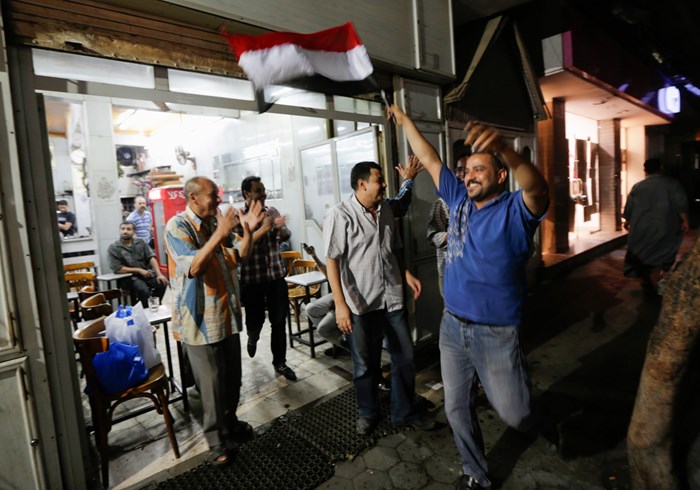
Five Egyptian Christians were killed and dozens injured in scattered violence following the ouster of President Mohamed Morsi, according to a report from Morningstar News.
Meanwhile, 51 pro-Morsi protestors are dead, killed in an altercation with the military, in which details are typically contradictory.
"We cannot be happy yet," said Youssef Sidhom, editor-in-chief of the Coptic newspaper Watani. "It seems Egypt must pay a bloody price before it gains its freedom."
Many Christians agree and worry about the future.
"I think the Muslim Brotherhood will be violent," said Bishop Marcos, a prominent member in the Holy Synod of the Coptic Orthodox Church. "They insist on restoring Morsi to his position."
The Brotherhood has called for peaceful protests, but has also spoken out against the role of the church in supporting Morsi's removal. Tawadros II, Coptic Orthodox pope, endorsed the removal of Morsi and, along with other prominent leaders, backed a political roadmap for reform. Related or not, violent attacks against Christians—including the murder of a priest—spiked after his statement.
Violence has gone both ways. Unhappy protestors attacked Muslim Brotherhood headquarters across Egypt in the lead-up to June 30, the one year anniversary of Morsi's inauguration. But the military role in the deaths of Islamist protestors bodes ill for the transition.
It also reminds Christians of the death of more than 20 Copts at the Maspero television building during the military-led transition in October 2011. Army tanks rolled over demonstrators as they protested an attack on an Upper Egyptian church.
Many Christians are ready to let bygones be bygones.
"Christians are not so naïve as to hold a grudge from the Maspero massacre," said Sidhom. "But it was Morsi's regime that did not permit that segment of the army from being investigated and punished."
Sidhom also balks at the notion debated in the West that Morsi's ouster was a military coup. He highlights the six month roadmap issued by the civilian interim president, which will elect a new parliament, amend the flawed and religiously-tinged constitution, and finally elect a new president.
When Morsi of the Muslim Brotherhood was elected as Egypt's first post-revolutionary president, most Christians gritted their teeth and hoped for the best. After a year of sectarian tension, deteriorating economic conditions, and deep political polarization, they are happy to see him go.
"At last, Egypt is now free from the oppressive rule of the Muslim Brotherhood!" wrote Anglican Bishop Mouneer Hanna Anis of the Episcopal Diocese of Egypt and North Africa.
His words could be echoed by the multitudes that filled Tahrir Square and surrounded the presidential palace on June 30. According to the Rebel Movement which led the protests, 22 million Egyptians gave their signature to demand early presidential elections.
"Christians and Muslims alike expressed their extreme and accumulated anger at Morsi's regime," said Sidhom.
"What took place was a people's revolution, looking to save the January 25 revolution from being hijacked by the Muslim Brotherhood to turn Egypt into an Islamic state."
But unlike the January 25 revolution that deposed former president Hosni Mubarak in 2011, this uprising is met with significant social resistance. Islamist supporters of Morsi also organized massive protests, however dwarfed in scale.
"The armed forces responded to the invitation of the people to intervene," wrote Bishop Mouneer, "and force the president to step down at the request of the people of Egypt."
Mouneer also called the action an answer to prayer, which triggers certain theological questions. In Romans 13, Paul writes that Christians are to be subject to the governing authorities. Does Christian participation in a popular uprising strain this interpretation?
"The leader must support human rights," said Bishop Marcos. "Because Morsi did not it was acceptable to work against him."
A more nuanced position is articulated by Emad Mikhail, president of the Alexandria School of Theology.
"The Bible in the first century does not address the situation of free expression as we have in many places today," he said. "There was no voting and no means to change the system except through violent action.
"If we vote out a president [as in modern elections] this is not understood to violate Romans 13. I consider peaceful demonstrations to be like a vote."
Not all the demonstrations were peaceful, however, and the specter of violence hangs over the nation. Many speak of a coming civil war, and hope the military intervention launches an inclusive process.
"All Egyptians are invited to participate and share in the new roadmap," said Sidhom. "Even the followers of the Muslim Brotherhood are welcomed to come back and participate as Egyptians."
That distinction might not be good enough. Early arrests of Islamist leaders—though subsequently released—and the closure of their satellite channels suggest the military action was more coup than many might want to admit.
Still, Mikhail wants to keep the violence in perspective, noting the proximity of the July 3 removal of the president to the July 4 Independence Day celebrations in the U.S.
"The American revolution took over 50,000 American lives through fighting and disease," he said, reflecting on events before the most recent killings. "Why not rejoice with us that our revolution [against the Brotherhood] cost only 50?"

Support Our Work
Subscribe to CT for less than $4.25/month


















